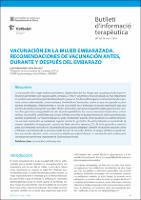| dc.contributor | Departament de Salut |
| dc.contributor.author | Urbiztondo-Perdices, Luis |
| dc.contributor.author | Borràs-López, Eva |
| dc.date.accessioned | 2019-02-22T14:39:24Z |
| dc.date.available | 2019-02-22T14:39:24Z |
| dc.date.issued | 2018-08 |
| dc.identifier.citation | Urbiztondo-Perdices L, Borràs-López E. Vacunació en la dona embarassada: recomanacions de vacunació abans, durant i després de l'embaràs. Butll Inf Ter. 2018 agost;29(07): 44-51. |
| dc.identifier.issn | 1579-9441 |
| dc.identifier.uri | https://hdl.handle.net/11351/3813 |
| dc.description | Vaccination; Pregnancy; Fetus |
| dc.description.abstract | Vaccination of the pregnant woman aims to avoid the risks that can be produced by preventable infections with vaccines on the mother, the developing fetus and the baby. It is very important not to limit the vaccination to the period of pregnancy, since it is essential to ensure the immunization of the pregnant woman against diseases such as rubella, varicella or measles, against which you can not vaccinate during pregnancy. Historically, the use of vaccination in pregnancy has been restricted under a premise of prudence regarding possible undesirable effects, as well as a possible poor response to vaccines. To guarantee safety in the face of this hypothetical possibility, attenuated vaccines (triple viral, antivaricellosis, BCG vaccine, antitifoidal oral, against yellow fever and intranasal flu) are contraindicated during pregnancy and it is recommended that pregnancy be avoided during the month after administration. Inactivated vaccines are considered safe during pregnancy. In each pregnancy, vaccination against whooping cough is systematically recommended between weeks 27 and 36 of pregnancy and against influenza, if the pregnancy coincides with the influenza vaccination campaign. It is also necessary to vaccinate against tetanus if the pregnant woman is not vaccinated. In case of presenting risk factors, selective vaccination can also be carried out with the inactivated vaccines that are indicated. Vaccination of the pregnant woman is a very important part of prenatal care. |
| dc.language.iso | cat |
| dc.language.iso | spa |
| dc.publisher | Departament de Salut |
| dc.publisher | Servei Català de la Salut |
| dc.relation.ispartofseries | Butlletí d'informació terapèutica;29(07) |
| dc.rights | Attribution-NonCommercial-NoDerivatives 4.0 International |
| dc.rights.uri | http://creativecommons.org/licenses/by-nc-nd/4.0/ |
| dc.source | Scientia |
| dc.subject | Vacunació |
| dc.subject | Embarassades |
| dc.subject | Fetus |
| dc.subject.mesh | Fetus |
| dc.subject.mesh | Vaccination |
| dc.subject.mesh | Pregnant Women |
| dc.title | Vacunació en la dona embarassada: recomanacions de vacunació abans, durant i després de l'embaràs |
| dc.title.alternative | Vacunación en la mujer embarazada: recomendaciones de vacunación antes, durante y después del embarazo |
| dc.type | info:eu-repo/semantics/article |
| dc.subject.decs | feto |
| dc.subject.decs | vacunación |
| dc.subject.decs | mujeres embarazadas |
| dc.type.version | info:eu-repo/semantics/publishedVersion |
| dc.audience | Professionals |
| dc.contributor.authoraffiliation | [Urbiztondo-Perdices L] Programa de vacunacions de Catalunya, Agència de Salut Pública de Catalunya (ASPCat), Generalitat de Catalunya, Barcelona, Spain. [Borràs-López E] Programa de vacunacions de Catalunya, Agència de Salut Pública de Catalunya (ASPCat), Generalitat de Catalunya, Barcelona, Spain. CIBER Epidemiología y Salud Pública (CIBERESP), Instituto de Salud Carlos III, Madrid, Spain |
| dc.rights.accessrights | info:eu-repo/semantics/openAccess |


